
Journal of Clinical and Translational Hepatology
Scope & Guideline
Connecting insights and innovations in hepatology.
Introduction
Aims and Scopes
- Clinical Application of Hepatology Research:
The journal emphasizes studies that translate laboratory findings into clinical applications, particularly focusing on hepatocellular carcinoma, autoimmune liver diseases, and metabolic liver disorders. - Innovative Diagnostic Techniques:
Research on novel diagnostic methods including imaging techniques, biomarkers, and non-invasive assessments of liver diseases is a significant focus. - Therapeutic Advancements:
The journal publishes studies on new therapeutic approaches for liver diseases, including drug development, immunotherapy, and combination treatments. - Epidemiological Studies:
There is a strong emphasis on epidemiological research that explores the prevalence, risk factors, and outcomes of liver diseases in diverse populations. - Pathophysiological Mechanisms:
The journal covers research that elucidates the underlying mechanisms of liver diseases, including metabolic dysfunction, viral infections, and immune responses. - Patient-centered Outcomes:
Research focusing on health-related quality of life, patient-reported outcomes, and the psychosocial impacts of liver diseases is also a core area.
Trending and Emerging
- Metabolic Dysfunction-associated Fatty Liver Disease (MAFLD):
Research focused on MAFLD has surged, reflecting growing recognition of its clinical significance and the need for tailored therapeutic strategies. - Immunotherapy and Personalized Medicine:
There is a rising interest in immunotherapeutic approaches for liver cancer and personalized medicine strategies that consider individual genetic and phenotypic variations. - Gut-Liver Axis Research:
Emerging studies exploring the role of gut microbiota in liver disease pathogenesis and treatment responses are increasingly prominent, indicating a multidisciplinary approach to liver health. - Artificial Intelligence and Machine Learning:
The integration of AI and machine learning in diagnosing and predicting outcomes in liver diseases is gaining traction, showcasing the journal's commitment to innovative research methodologies. - Patient-Centric Research:
There is an increasing focus on patient-reported outcomes and quality of life assessments, reflecting a broader trend towards prioritizing patient experiences in clinical research. - Viral Hepatitis and Novel Therapeutics:
Ongoing research into hepatitis viruses, particularly hepatitis B and C, continues to evolve with the advent of novel therapeutic agents and treatment regimens.
Declining or Waning
- Traditional Pharmacotherapy for Hepatitis:
Research related to traditional antiviral therapies for hepatitis B and C is declining as new, more effective agents and treatment protocols are being developed and adopted. - Invasive Diagnostic Procedures:
There is a noticeable decrease in studies focusing on invasive diagnostic procedures for liver diseases, as non-invasive methods gain preference due to their safety and efficacy. - Longitudinal Studies of Chronic Liver Disease:
Long-term follow-up studies of chronic liver disease are less frequently published, potentially due to a shift towards more immediate clinical outcomes and treatment efficacy studies. - Basic Science without Clinical Relevance:
Research that does not directly link basic science findings to clinical applications is becoming less common, as the journal prioritizes translational research that impacts patient care. - Studies on Rare Liver Diseases:
There is a reduction in the volume of studies focused on rare liver diseases, possibly due to limited patient populations and funding opportunities.
Similar Journals
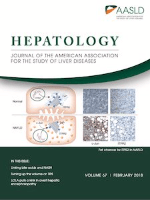
HEPATOLOGY
Transforming liver health with groundbreaking insights.HEPATOLOGY is a premier scholarly journal dedicated to advancing the field of liver research and clinical practice. Published by Lippincott Williams & Wilkins, this journal boasts an impressive impact factor and holds a prestigious position as one of the top-ranked publications in both Hepatology (Q1) and Medicine (miscellaneous, Q1) categories as of 2023. HEPATOLOGY, with its commitment to disseminating high-quality research since its inception in 1981, serves as an essential platform for researchers, clinicians, and students focusing on liver diseases, including hepatitis, cirrhosis, and liver cancer. The journal's editorial board comprises leading experts who guide the publication towards its objective of fostering innovation and collaboration in this critical area of health. Although it does not offer an open access model, HEPATOLOGY ensures that its comprehensive analyses, reviews, and groundbreaking studies are accessible to the global medical community. Join the discourse in hepatology and be a part of a transformative journey through this indispensable resource.
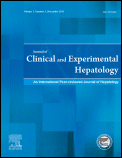
Journal of Clinical and Experimental Hepatology
Connecting experts to elevate the field of hepatology.The Journal of Clinical and Experimental Hepatology, published by Elsevier - Division Reed Elsevier India Pvt Ltd, is a premier platform dedicated to advancing the field of hepatology. With an ISSN of 0973-6883 and an E-ISSN of 2213-3453, this journal has gained recognition for its impactful contributions to both clinical practice and scientific research in the domain of liver health. Ranking in the Q2 quartile for Hepatology in 2023 and positioned at 33rd out of 82 in Scopus’s Hepatology category, it reflects a robust impact factor and a commitment to publishing high-quality, peer-reviewed articles. Researchers, clinicians, and students can engage with a wealth of open-access content covering the latest advancements, challenges, and insights in hepatology, as the journal aims to disseminate knowledge from 2011 through 2025. Join the community of experts as we explore critical developments in the understanding and treatment of liver diseases.

JHEP Reports
Driving excellence in gastroenterology and internal medicine.JHEP Reports, published by ELSEVIER, stands at the forefront of scholarly communication in the fields of Gastroenterology, Hepatology, Immunology and Allergy, and Internal Medicine. As an Open Access journal since 2019, it provides a platform for the dissemination of high-quality research findings, making vital information readily accessible to a global audience. With a commendable impact characterized by a Q1 category ranking across four medical disciplines in 2023, JHEP Reports demonstrates its significance and influence, reflected in its impressive Scopus ranks—#11 in Gastroenterology and #14 in Internal Medicine, amongst others. This esteemed journal not only plays a critical role in advancing knowledge but also fosters collaboration among researchers, practitioners, and students keen on exploring innovations and breakthroughs in health sciences. At RADARWEG 29, 1043 NX AMSTERDAM, NETHERLANDS, JHEP Reports is committed to bridging the gap between research and application, ushering in a new era of informed and effective healthcare solutions.
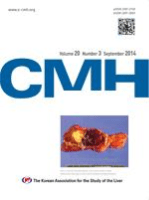
Clinical and Molecular Hepatology
Pioneering insights in hepatology and molecular biology.Clinical and Molecular Hepatology, published by the Korean Association for the Study of Liver, stands at the forefront of hepatology, offering a significant platform for research and innovation in liver diseases. Established in 1995 as an open access journal, it aims to disseminate high-quality research that spans the fields of hepatology, molecular biology, and medicine. With an impressive impact factor ranking it in the Q1 category for 2023 in both Hepatology and Molecular Biology, the journal facilitates a rich exchange of knowledge among professionals, researchers, and students globally. With its dedicated coverage from 2012 to 2024 and exceptional Scopus rankings placing it within the top 10% of journals in its field, Clinical and Molecular Hepatology is an indispensable resource for advancing the understanding and treatment of liver conditions. Located in Seoul, South Korea, the journal emphasizes rigorous peer review and is committed to enhancing clinical practice and molecular research, making it an ideal venue for groundbreaking studies in liver health.

World Journal of Hepatology
Connecting global researchers to advance hepatology knowledge.World Journal of Hepatology is a premier academic journal dedicated to advancing the field of hepatology. Published by BAISHIDENG PUBLISHING GROUP INC, this journal serves as a crucial platform for disseminating innovative research findings and critical reviews from around the globe. With its ISSN 1948-5182 and E-ISSN 1948-5182, the journal has established a notable presence since its inception in 2009, covering a wide range of topics relevant to liver diseases, including but not limited to hepatitis, liver cancer, and metabolic liver disorders. Currently ranked 41/82 in the field of hepatology by Scopus, representing the 50th percentile, it has achieved a Q3 quartile ranking in the 2023 category, underscoring its growing influence in the medical community. With a commitment to open access for its readership, the World Journal of Hepatology enriches the global discourse on liver health and disease management, making it an essential resource for researchers, clinicians, and students alike.
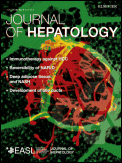
JOURNAL OF HEPATOLOGY
Unraveling the Complexities of Liver DiseasesJOURNAL OF HEPATOLOGY, published by Elsevier, stands as a preeminent source in the field of Hepatology, with its impact underscored by a remarkable 2023 Category Quartile of Q1 and a Scopus rank of 3rd out of 82 journals, placing it in the 96th percentile for the discipline. Since its inception in 1985, this journal has been a vital conduit for the dissemination of pioneering research, clinical studies, and reviews related to liver diseases and their impact on global health. Although it currently does not offer open access options, the journal is committed to providing top-tier content to its readership—researchers, medical professionals, and students—in order to advance knowledge and foster innovation in hepatology. With a broad and inclusive scope, it aims to cover significant breakthroughs, therapeutic advancements, and epidemiological studies, continually pushing the boundaries of understanding in liver health. The journal is based in Amsterdam, Netherlands, and remains an essential resource for those dedicated to the progression of hepatologic science.

Hepatology Forum
Connecting professionals for a healthier tomorrow.Hepatology Forum is an esteemed journal dedicated to disseminating cutting-edge research and insights in the fields of gastroenterology and hepatology. Published by KARE PUBL in Turkey, this journal serves as a vital platform for researchers, clinicians, and healthcare professionals aiming to advance their knowledge and practices related to liver diseases and gastrointestinal disorders. With an ISSN of 1307-5888 and an E-ISSN of 2757-7392, it features peer-reviewed articles that encompass a wide range of topics from basic research to clinical applications. Although categorized in the Q3 quartile for both gastroenterology and hepatology in 2023, Hepatology Forum continues to show significant potential for growth and impact, as evidenced by its Scopus rankings. Through its commitment to open scientific exchange, the journal not only facilitates the sharing of innovative methodologies and findings but also fosters networking among professionals in the field. As it converges through the years from 2020 to 2024, Hepatology Forum remains an important resource for the advancement of liver health and diseases, appealing to both established experts and emerging scholars alike.
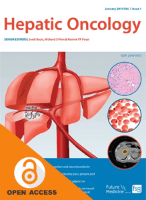
Hepatic Oncology
Advancing the Frontiers of Liver Cancer ResearchHepatic Oncology is a premier Open Access journal published by Future Medicine Ltd that specializes in the critical intersection of hepatology and oncology. With a focus on advancing knowledge in the diagnosis and treatment of liver cancers, the journal provides a platform for innovative research, reviews, and clinical perspectives that serve as a valuable resource for researchers, clinicians, and students alike. Established in 2016 and evolving over the years, Hepatic Oncology underscores its commitment to accessible scientific communication, having transitioned to open access in 2018 to reach a broader audience. The journal holds a Q4 quartile ranking in the fields of hepatology and oncology for 2023, reflecting its emerging influence and role in contemporary research. Through high-quality articles and a focus on real-world applications, Hepatic Oncology aims to bridge gaps in knowledge while fostering collaboration among professionals dedicated to enhancing patient care in hepatic malignancies.
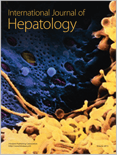
International Journal of Hepatology
Pioneering insights for a healthier liver tomorrow.The International Journal of Hepatology, published by HINDAWI LTD, is a premier open-access journal dedicated to the field of hepatology. Since its inception, this journal has championed the dissemination of cutting-edge research and reviews pertaining to liver health, diseases, and therapies. With an ISSN of 2090-3448, the journal has been committed to open-access publishing since 2011, ensuring that vital knowledge is readily available to researchers, clinicians, and students worldwide. Based in Egypt, this journal stands out in its category, achieving a Q3 ranking in 2023 within the scope of Hepatology by Scopus, which ranks it #43 out of 82 in the field. The International Journal of Hepatology offers a platform for significant findings and discussions that influence clinical practices and foster new research directions, thus playing a crucial role in advancing the understanding of liver diseases and their management.
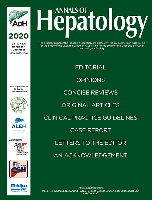
Annals of Hepatology
Unlocking the mysteries of liver health and disease.Annals of Hepatology is an esteemed open-access journal dedicated to the dynamic field of liver research and hepatology. Published by Elsevier España since 2002, this journal has established itself as a pivotal resource for researchers and clinicians alike, boasting a remarkable impact in the medical community with its 2023 rankings placing it in the Q2 quartile for Hepatology and Q1 quartile in Medicine (Miscellaneous). With an impressive Scopus rank of #20 out of 82 in the field of Hepatology and a notable 76th percentile standing, the journal is committed to disseminating high-quality, peer-reviewed articles that advance the understanding of liver diseases and their management. The editorial scope encompasses a broad range of topics, including liver pathology, therapeutic interventions, and public health implications related to hepatic disorders. Researchers, healthcare professionals, and students interested in the latest advancements in hepatology will find Annals of Hepatology an invaluable platform for sharing and accessing knowledge, with the convenience of open access enhancing global visibility and collaboration in this critical field of medicine.